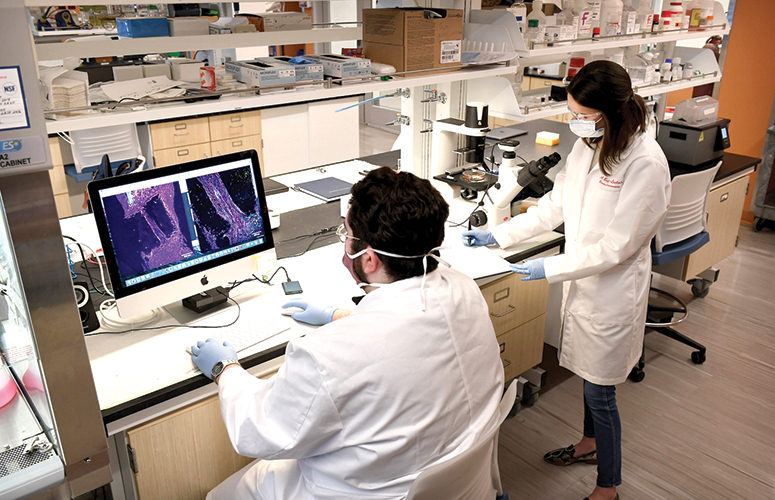
The MBA Concentration Equation
Amid a worldwide rise in business school applications, the venerable MBA has academic specialization options that benefit both students and, in turn, corporate employers.
By George N. Saliba, Contributing Writer On Mar 4, 2022New Jersey’s higher education institutions offer an array of specialized MBA programs that are not only popular with students, but are also in demand with employers seeking graduates who possess both valuable technical and communication skills. And, instead of the coronavirus pandemic slowing students’ interest in MBA programs, it has yielded an increase in MBA program enrollments.
Several educators note that the 2020 pandemic resulted in many people enrolling in MBA programs because, in the words of one dean, “students weren’t really sure what to do [during the pandemic] and they didn’t want to take a year to not do anything.” The Graduate Management Admission Council (GMAC) found that across almost 1,000 MBA and business master’s programs worldwide, there was a .4% increase in 2021 applications when compared to 2020’s “unusually high” 2.4% increase in applications caused by the pandemic’s “economic uncertainty” (the year 2019, in contrast, saw graduate business school applications decrease by 3.1%, partly due to a strong labor market).
Popular MBA Concentrations
While 75% to 80% of most MBA concentration programs are comprised of a core curriculum, remaining classes enable students to choose a specialty, with the college admissions services company, The Princeton Review, reporting that the MBA concentrations students most pursue are in the realms of strategy, corporate finance, operations, entrepreneurship and management.
Jennifer Maden, assistant dean and director of graduate studies for the Rohrer College of Business at Rowan University in Glassboro – an institution that offers at least 11 different MBA concentrations – says that management, finance and accounting MBA specializations are popular. She adds, “We are [also] seeing a lot of interest from students in both business analytics and data analytics [MBA concentrations].” Analytics expertise is required across many industries due to the large amount of digital information companies process today.
Maden says, “If I had to [forecast] a couple of years from now, I would say that we are probably going to see a good amount of growth in those analytics concentrations, but they are brand new – we just started offering them – so they don’t have the history that a management [concentration] does.”
Anthony Bowrin, PhD, dean of The Cotsakos College of Business at William Paterson University, reports that his institution’s most popular MBA concentrations are human resources management, finance and accounting, with the largest category a “general” MBA without a concentration.
“We started [the human resources concentration] in the fall of 2020,” he explains. “It’s already our second-largest concentration, and the thinking [when we created it] was two-fold: On the one side, there are lots of career opportunities in HR. We see a mix of both current HR professionals looking to [advance their careers], as well as persons who started in other areas, but want to get into HR because they see opportunities there. [Also] … more firms are realizing that it is employees who give their companies competitive and sustainable advantages, and therefore, they want [HR] professionals who can work with [these] employees in order to add value to their firms.
He adds, “In terms of both accounting and finance [MBA concentrations], there are so many [career] opportunities in the tri-state region. We can’t produce enough graduates in those areas for accounting, Wall Street and real estate firms. Students recognize those opportunities, and they gravitate towards [these MBA concentrations].”
Jonathan Daigle, PhD, MBA, assistant professor of finance in the department of economics, finance and real estate at Monmouth University, says many students are pursuing MBAs with concentrations in finance because, “No. 1, students are always enamored with finance … it is about money … they can work in corporate finance, investment banking, and equity or debt research. It is seen as prestigious.” He adds that students are also interested in the concentration because finance is used for decision making in any business.
Developing New MBA Concentrations
Higher education institutions invest enormous time and energy into developing MBA concentrations that are simultaneously popular with students and in tune with the labor market’s demands, and they routinely consult with students, alumni, advisory boards, and companies.
When contemplating a new MBA concentration, William Paterson University’s Bowrin says his institution begins by examining government labor projections, and that information is then brought to the university’s advisory board for validation in a “back-and-forth” conversation that also includes input from non-advisory board employers.
Bowrin says new William Paterson University MBA concentrations in sales strategy, healthcare economics, management and applied business analytics are likely to launch this summer, with the sales strategy concentration stemming from requests from employers who are familiar with William Paterson University’s Russ Berrie Institute for Professional Sales and want to see the university offer graduate-level courses.
Choosing an MBA Concentration
While most MBA students are in their mid-to-late twenties, to early and mid-30s, there are also students in their 40s, 50s and 60s. Rowan University’s Maden says that selecting an MBA concentration seems to be less stressful for those who are further along in their established careers when compared to younger students with less professional experience.
Within MBA programs, some experts seem to disagree whether an MBA degree specialization in, say, human resources, might hinder a student’s decision to later move into a career such as finance. However, Maden says overall, “I have not had any of our students or alumni come back and share anything about having a particular MBA concentration being too narrowly focused for them – I’ve not heard that from anyone.”
Monmouth University’s Daigle says, “I don’t think a student would necessarily be pigeon-holed [for taking a specific concentration]. In fact, I think they are going to be fine. Especially in this job market right now, one of the things that I have seen … is that companies are looking for innovative ideas, and they take people on because they need analytical thinking and understanding.”
Modalities
Approximately 70% to 75% of Rowan University’s students work full-time while they are pursuing their MBA degrees part-time, and many other New Jersey MBA programs have similar student bodies. This means that being able to choose from a mix of online and in-person courses, among other options, is important to students.
William Paterson University’s Bowrin notes that his institution’s online courses are offered asynchronously, so instead of students being required to log onto a live class at a certain time, they can instead view the class when it is convenient to do so.
Conclusion
Whether online or in person, the venerable general MBA – or one of its specialized concentrations – affords students a long-term leg up in the marketplace, and New Jersey’s myriad colleges and universities stand ready to assist by keeping their fingers on the pulse of both academic and marketplace trends.
To access more business news, visit NJB News Now.






